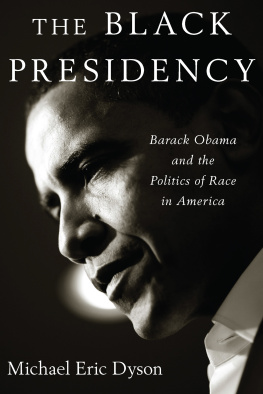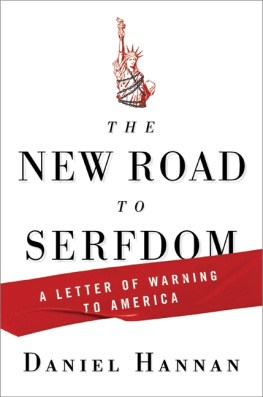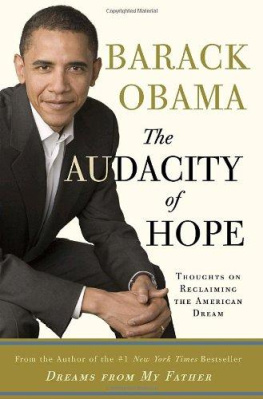Obamas America
To my daughters,
Lauren and Kate,
whom I love with all my heart

Obamas America
A TRANSFORMATIVE VISION OF OUR NATIONAL IDENTITY
IAN REIFOWITZ
FOREWORD BY ELLIS COSE

Potomac Books Washington, D.C.
Copyright 2012 by Ian Reifowitz
Published in the United States by Potomac Books, Inc. All rights reserved. No part of this book may be reproduced in any manner whatsoever without written permission from the publisher, except in the case of brief quotations embodied in critical articles and reviews.
Library of Congress Cataloging-in-Publication Data
Reifowitz, Ian.
Obamas America : a transformative vision of our national identity / Ian Reifowitz.1st ed.
p. cm.
Includes bibliographical references and index.
ISBN 978-1-61234-472-0 (hardcover : alk. paper)ISBN 978-1-61234-473-7 (electronic)
1. Obama, BarackInfluence. 2. Obama, BarackSocial and political views. 3. National characteristics, American. 4. MulticulturalismUnited States. 5. Political cultureUnited States. 6. United StatesRace relations. 7. United StatesEthnic relations. 8. United StatesPolitics and government2009- I. Title.
E908.3. R45 2012
973.932dc23
2012014719
Printed in the United States of America on acid-free paper that meets the American National Standards Institute Z39-48 Standard.
Potomac Books
22841 Quicksilver Drive
Dulles, Virginia 20166
First Edition
10 9 8 7 6 5 4 3 2 1
Related Titles from Potomac Books
American Avatar: The United States in the Global Imagination
Barry A. Sanders
Getting Immigration Right: What Every American Needs to Know
David Coates and Peter Siavelis, eds.
The Obama Haters: Behind the Right-Wing Campaign of Lies, Innuendo & Racism
John Wright
The Politics of Gratitude: Scale, Place & Community in a Global Age
Mark T. Mitchell
Youre Not as Crazy as I Thought (But Youre Still Wrong):
Conversations between a Die-Hard Liberal and a Devoted Conservative
Phil Neisser and Jacob Hess
The Mythology of American Politics: A Critical Response to Fundamental Questions
John T. Bookman
New Common Ground: A New America, a New World
Amitai Etzioni
Fascism: Why Not Here?
Brian E. Fogarty
Contents
Foreword
For centuries, blacks and assorted other so-called minorities in America were defined by their othernesstheir options circumscribed by the general assumption that they were too alien, too indigestible, to fully melt into the American pot. In The Souls of Black Folk, W. E. B. Du Bois poignantly described the bewilderment and alienation that such beliefs could engender: [It] dawned upon me that I was different from the others; or like, mayhap, in heart and life and longing, but shut out from their world by a vast veil.
With the election of Barack Obama, many Americans believe, that veil was forever lifted. With one grand gesture, America shook off the prejudices of its past and fully embraced a presidential candidate with visible ancestry from a continent once deemed so savage that its offspring were relegated to the role of slave.
Obamas march to the presidency was Americas second beginning; its opportunity, at long last, to exorcise the ghost of Jim Crow. And if public opinion polls are to be believed, a substantial number of Americans thought that their country had finally got things right. Of all the surveys taken in the wake of Obamas victory, the most intriguing came courtesy of CNN. It was an attempt, on the eve of Obamas inauguration, to measure how far we had come since Martin Luther King Jr. challenged America to live out the true meaning of its creed: We hold these truths to be self-evident, that all men are created equal.
The question posed by CNN/Opinion Research Corporation in January 2009 was this: Martin Luther King gave his famous I Have a Dream Speech at a civil rights march in Washington in 1963. In your view, do you think the U.S. has fulfilled the vision King outlined in that speech, or dont you think so?
Americans were evenly divided in their responses: 49 percent said yes, and 49 percent said no. In January 2011, CNN repeated the question in a new poll, and the results were essentially the same: 48 percent said yes, and 49 percent said no. Among black Americans, the percentage agreeing that Kings vision had been fulfilled was substantially higher. When asked the question in 2009, some 69 percent said yes. CNN did not break out the African American responses separately in 2011, presumably owing to the small sample size.
For a nation less than a century removed from the age when blacks could be lynched with impunity, a nation only two generations away from the death of Jim Crow, a nation still wrestling with the reality of highly segregated ghettos in its midst, that was an amazing self-assessment. And it said volumes about the eagerness of Americansand blacks in particularto embrace the prospect of change, particularly given that the assessment, only a few months prior to Obamas election, had not been nearly as optimistic. In early 2008 (the poll was conducted between March 26 and April 2) when CNN asked the question regarding Kings dream of racial equality, only 34 percent of respondents were ready to say that Kings vision had been realized. Its extremely unlikely that the reality on the ground changed so much in a few months.
While researching my book The End of Anger, I asked David Thomas, a black Harvard Business School professor, to give his assessment of the CNN survey results. He laughed and replied, Its irrational exuberancea phrase coined by former Federal Reserve Board chairman Alan Greenspan to describe why investors pour money into collapsing financial assets, artificially and temporarily inflating their value.
Im inclined to agree that there was something irrational about the judgment. There is simply no real evidence that Obamas election was such a game changer, that it substantially altered, in any measurable way, the condition of most blacks or other people of color in America. And certainly, it did not make America a place where all men are created equala point the Occupy Wall Street movement drove home.
What it did was show that America was ready to take a step that many, probably most, African Americans had not dared to believe it would take any time soon if ever. So by the simple act of getting himself elected president of the United States, Barack Obama hacked a huge chunk out of a glacier of black pessimism. And he simultaneously gave whites an opportunity to collectively congratulate themselves for eschewing racial favoritism and elevating a deserving black son.
Not surprisingly, many Americans considered that quite a big deal. Following Obamas election, Gallups pollsters essentially asked respondents to rank the importance of the event. More than two-thirds said that they considered Obamas election among the top three advances for blacks in the last hundred years.
So why was his election so important? Is it because by making it into the Oval Office, Obama expanded the publics perception of what is possible for a black man in America to become? Or does its importance go far beyond that? Put another way: Is there something special about Obama himself? Does he possess personal qualities that are so remarkable, and leadership skills so potentially transformative, that he will lead America to a state of higher consciousness?
Next page








